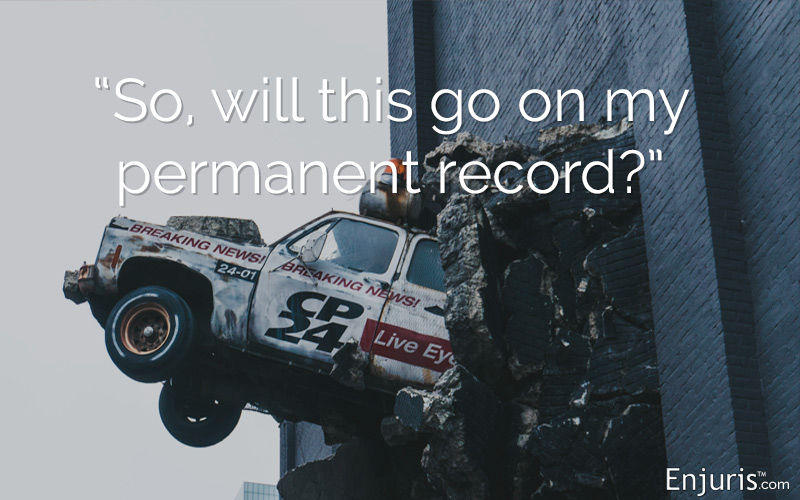Hablamos español.

Does a car accident go on your permanent driving record? What if the accident isn’t your fault?
During high school, your teacher may have tried to scare you into behaving by threatening to make a note of your misdeeds in your “permanent record.”
You’ll be pleased to learn that, in most cases, schools don’t maintain permanent records and these threats were nothing more than a scare tactic.
But what happens if you’re involved in a car accident?
Does a Texas car accident go on your permanent record? Do insurance companies have access to this permanent record? What if the crash wasn’t your fault?
Do permanent driving records exist in Texas?
Under Texas Transportation Code § 550.062, the law enforcement officer investigating your car accident must complete and submit a crash report to the Texas Department of Transportation (TxDOT) within 10 days of the crash.
The TxDOT maintains a database of these crash reports. You might say this is a “permanent record” of sorts.
However, just because the TxDOT maintains accident records doesn’t mean the records can be accessed by just anyone.
Under Texas Transportation Code § 550.065, only the following people can obtain your crash report:
- Any person involved in the accident
- The authorized representative of any person involved in the accident (for example, the person’s attorney)
- A driver involved in the accident
- An employer, parent, or legal guardian of a driver involved in the accident
- The owner of a vehicle or property damaged in the accident
- A person who has established financial responsibility for a vehicle involved in the accident (for example, a policyholder of a motor vehicle liability insurance policy covering the vehicle)
- An insurance company that issued an insurance policy covering a vehicle involved in the accident
- An insurance company that issued a policy covering any person involved in the accident
- A person under contract to provide claims of underwriting information to an insurer
- A radio or television station that holds a license issued by the Federal Communications Commission
- A newspaper that is free or qualified to publish legal notices
- Any person who may sue because of death resulting from the accident
The Texas Department of Public Safety (TxDPS) also maintains driver records for all Texas drivers. The records include information on citations, crashes, and license suspensions. You can order a copy of your report from the TxDPS webpage after providing certain information, such as your driver's license number, and paying a fee.
Can your driving record negatively impact you in Texas?
If you’ve received a number of citations or if you’ve been involved in a number of car accidents, your permanent driving record can hurt you in 2 principal areas: employment and obtaining reasonably-priced insurance.
Employment
Many occupations require that you have a spotless or near-spotless driving record. The most obvious occupations that require excellent driving records include commercial truck driver, driving instructor, and personal driver.
But there are other occupations where your driving record could negatively impact your chances of employment. For example, attorneys must pass background checks in order to become licensed, and a state can deny a license based on excessive traffic violations.
On the other hand, if you don’t have excessive citations and you weren’t responsible for causing the accidents identified in your driving record, it’s unlikely that you won’t get a job because of your driving record — though it’s possible that a long history of accidents will raise a red flag with employers. If you’ve been in an unusual number of accidents, be prepared to explain the details to potential employers.
Insurance
When it comes to insurance, drivers who make lots of mistakes on the road typically have to pay higher premium rates because the insurance company has to pay out more claims on their behalf.
For example, if you lose control of your car and crash into someone’s mailbox, your auto insurance will have to cover the damage you cause. As a result, you may pay higher premiums to make up the difference.
Drivers who weren’t at fault for an accident generally don’t see an increase in their insurance premiums. However, you might see higher premiums after an accident if you have a certain type of coverage on your auto policy that covers you regardless of who’s at fault and you make a claim against that coverage.
For example, if you have personal injury protection (PIP) coverage, which covers medical expenses regardless of who’s at fault for the accident, your PIP premiums may increase after you utilize the coverage, even if the accident wasn’t your fault.
Check your policy to learn more about the specifics of how claims impact your premiums. And if you aren’t sure where to start, talk to a local attorney.
In most cases, you shouldn’t have to suffer because of someone else’s errors in judgment. If you believe you’re being treated unfairly because of your driving record, contact an experienced Texas attorney to explore your options.
See our guide Choosing a personal injury attorney.

